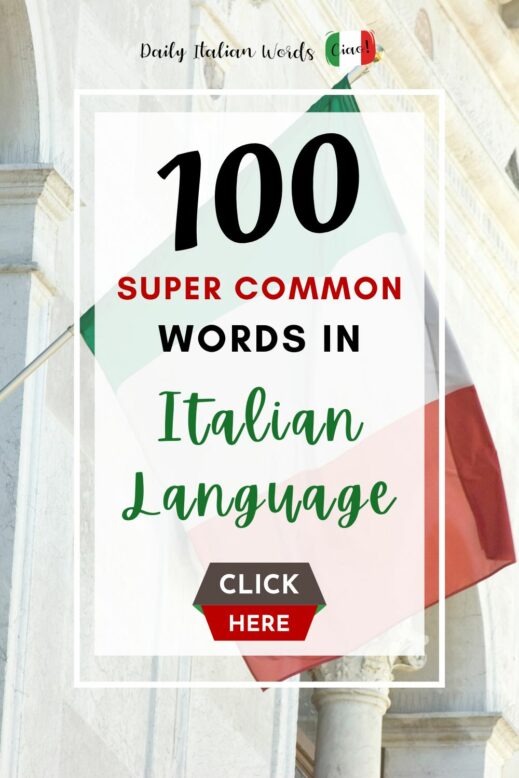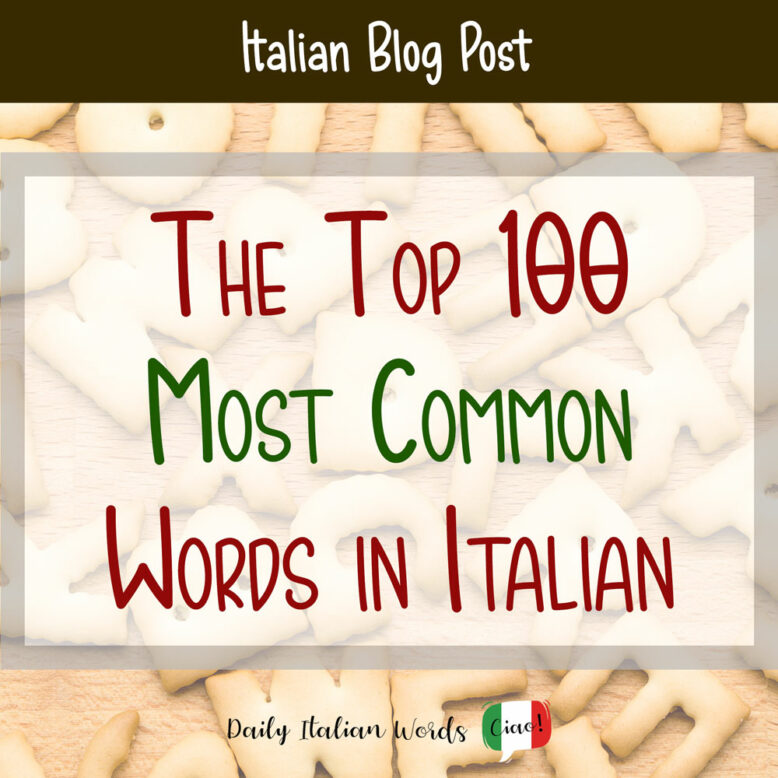As in all languages, some words appear more frequently than others in Italian. This happens because in everyday life we tend to repeat the same words over and over again, simplifying our speech and making it more accessible to the listener.
This also facilitates the study of a new language, as even a small vocabulary can be sufficient to express and understand basic concepts and therefore to engage immediately in conversation.
Today we will talk about 100 words widely used in Italian divided between nouns, adjectives, verbs, adverbs of various kinds. The noun category is obviously the most numerous, so this is the one we will start with.

Note: We’ve opted not to provide audio or example sentences for each word within this article, as doing so would make the article too long. Instead we have added links to the relevant articles that describe each word in detail. As of now, not all words link to a dedicated article, but this will change as we gradually expand our word database.
Most Common Italian Nouns
Amore – love
Plural: amori
Gender: masculine
Animale – animal
Plural: animali
Gender: masculine
Auto (automobile) – car
Plural: automobili
Gender: feminine
Affare – affair, matter, bargain
Plural: affari
Gender: masculine
Bambino / Bambina – boy / girl
Plural: bambini / bambine
Gender: masculine / feminine
Cosa / Coso – thing / thingy
Plural: cose / cosi
Gender: feminine / masculine
Casa – house or home
Plural: case
Gender: feminine
Città – city
Plural: città
Gender: feminine
Clima – climate
Plural: climi
Gender: masculine
Famiglia – family
Plural: famiglie
Gender: feminine
*The masculine famiglio is an antiquated term that means servant but it isn’t commonly used.
Festa – party
Plural: feste
Gender: feminine
Figlio / Figlia – son / daughter
Plural: figli / figlie
Gender: masculine / feminine
Forza – strength
Plural: forze
Gender: feminine
Gente – people
Plural: genti
Gender: feminine
*Gente is a collective noun. It only appears in its plural form genti in poetry, or when referring to populations.
Giorno – day
Plural: giorni
Gender: masculine
Luce – light
Plural: luci
Gender: feminine
Mamma – mom
Plural: mamme
Gender: feminine
Mano – hand
Plural: mani
Gender: masculine in the singular, feminine in the plural
Mare – sea
Plural: mari
Gender: masculine
Modo – way, manner
Plural: modi
Gender: masculine
Moda – fashion
Plural: mode
Gender: feminine
Mondo – world
Plural: mondi
Gender: masculine
Montagna – mountain
Plural: montagne
Gender: feminine
Nome – name
Plural: nomi
Gender: masculine
Ora – hour / time
Plural: ore
Gender: feminine
Paese – country / town
Plural: paesi
Gender: masculine
Pizza – pizza
Plural: pizze
Gender: feminine
Posto – place
Plural: posti
Gender: masculine
Ricetta – recipe
Plural: ricette
Gender: feminine
Signore / signora – (gentle)man / lady
Plural: signori / signore
Gender: masculine / feminine
Sole – sun
Plural: soli
Gender: masculine
Tempo – time / weather
Plural: tempi
Gender: masculine
Vestito – clothes / suit / dress
Plural: vestiti
Gender: masculine
Vino – wine
Plural: vini
Gender: masculine
Vita – life
Plural: vite
Gender: feminine
Uomo – man / human being
Plural: uomini
Gender: masculine
Most Common Italian Adjectives
Bello / Bella – beautiful
Plural: belli / belle
Caldo / Calda – hot
Plural: caldi / calde
Caro / Cara – expensive / dear
Plural: cari / care
Comodo / Comoda – comfortable
Plural: comodi / comode
Corto / Corta – short
Plural: corti / corte
Difficile – difficult
Plural: difficili
Economico / Economica – cheap / inexpensive
Plural: economici / economiche
Facile – easy
Plural: facili
Fresco / Fresca – fresh
Plural: freschi / fresche
Grande – big / great
Plural: grandi
Lontano / Lontana – far
Plural: lontani / lontane
Lungo / Lunga – long
Plural: lunghi / lunghe
Normale – normal
Plural: normali
Nuovo / Nuova – new
Plural: nuovi / nuove
Perfetto / Perfetta – perfect
Plural: perfetti / perfette
Piccolo / Piccola – small / little
Plural: piccoli / piccole
Questo / Questa – this
Plural: questi / queste
Quello / Quella – that
Plural: quelli / quelle
Semplice – simple
Plural: semplici
Stupido / Stupida – stupid
Plural: stupidi / stupide
Tanto / Tanta – a lot / many
Plural: tanti / tante
Utile – useful
Plural: utili
Vecchio / Vecchia – old
Plural: vecchi / vecchie
Vicino / Vicina – close / near
Plural: vicini / vicine
Vuoto / Vuota – empty
Plural: vuoti / vuote
Most Common Italian Verbs
Abitare – to live
Andare – to go
Avere – to have
Bere – to drink
Capire – to understand
Comprare – to buy
Dare – to give
Dire – to say / to tell
Dovere – must / to have to
Essere – to be
Fare – to do / to make
Mangiare – to eat
Parlare – to talk / to speak
Potere – can / to be able to
Prendere – to get / to take
Sentire – to feel
Vedere – to see
Venire – to come
Volere – to want
Vestire – to dress
Most Common Italian Adverbs
Adesso – now
Allora – so / then
Anche – also / too
Bene – good / well
Davanti – in front of
Dietro – behind
Dopo – after / later
Dove – where
Dunque – so / therefore
Frequente – frequent
Eccetera – eccetera
Male – badly / poorly
Mentre – while
Ora – now
Prima – before
Sopra – on top of / above / over
Soprattutto – especially
Sotto – under / underneath
Spesso – often

Allegra Lucarelli, known professionally as allegraLu, is a certified Neurolanguage Coach for child bilingualism and a native Italian speaker who speaks English fluently. She helps families raise their children to be bilingual and multilingual at AllegraLu.com.


